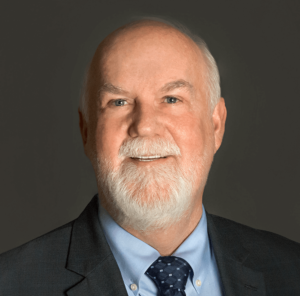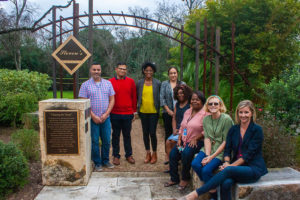TRANSPARENCIES
A monthly newsletter from Integral Care.
A monthly newsletter from Integral Care.

A Message From Our CEO
 Mental health issues and substance use disorders (SUDs) rarely occur independently. Why then, are they so often addressed separately, without a more coordinated system of care? Treating the whole person is always the most effective strategy.
Mental health issues and substance use disorders (SUDs) rarely occur independently. Why then, are they so often addressed separately, without a more coordinated system of care? Treating the whole person is always the most effective strategy.
Improving health outcomes for our community begins with recognizing the co-occurrence of mental health issues and substance use disorders. It is often the same person experiencing both, however a disconnected delivery of care can require them to have multiple interactions with various providers. 7.9 million people in the U.S. experience both a mental illness and substance use disorder. Having a single point of entry with coordination of care across systems would help link mental health and substance use care effectively.
Currently, Texas has the third lowest ratio of providers, with around 18 per 1,000 adults with a substance use disorder. One of the main challenges in providing a more coordinated delivery of services is the misalignment between reimbursement rates and the cost of providing services. It costs about $475 to $500 a day to provide intensive residential treatment in a substance use licensed facility, however the state reimbursement rate is $180. Low reimbursement rates make it challenging to recruit and retain a provider network. Additional challenges include stringent licensure requirements and regulations that create a separation in the delivery of mental health and substance services.

Teresa, one of many Integral Care clients who lives with mental illness and substance use disorder
Austin-Travis County’s community of providers as well as state government have taken substantial steps in addressing these challenges. The State of Texas, through its Statewide Behavioral Health Strategic Plan, recognizes the importance of person-centered care that is fully integrated. And, during this past interim, the new House Select Committee on Opioids and Substance Abuse investigated the impact of substance use disorder on individuals, families and communities.
For the current legislative session, which began last month, the Health and Human Services Commission (HHSC) has made a $45.3M legislative appropriations request for substance use disorder treatment. They propose reimbursement rate adjustments for recovery services and technology changes. HHSC also launched a new Peer Support Medicaid Benefit for People with Mental Illness and SUDs on January 1, in response to HB 1486, which passed during the 85th legislative session.
As we look for ways to better integrate substance use services into our healthcare system, Integral Care is working to make treatment more readily available for our community, though there is room for more progress.
It is critical that efforts to integrate substance use and mental health services continue. Collaboration between mental health, substance-use and primary healthcare providers to promote systemic change will help individuals in our community connect to recovery programs and improve their overall health and well-being.

David Evans
Chief Executive Officer
ALAMEDA HOUSE
When individuals with mental health issues and substance use disorder have access to long-term residential care, they gain the tools to recover and reach their full potential. Integral Care’s Alameda House is a program for people who, in addition to their co-occurring disorders, experience chronic homelessness and involvement with our criminal justice system. The program, which offers residential services for up-to-3-months, helped approximately 50 members of our community move towards better health and well-being in FY18.
I have the tools, now, in my tool bag, to control the illness and not let it control me. And I heard, in a special program, “it works if you work it”. Well, that is true.
– Teresa, Alameda House client

Upon entering, clients work with staff to determine an individualized treatment plan and set goals. They spend the first month attending our Oak Springs Intensive Outpatient treatment program – in day-long groups focused on life skills, like anger management and relapse prevention strategies. Clients may also be learning how to set up an email account, write a resume, and take the bus. Graduating to the second level of the program involves working a 12-step program with a sponsor and applying for jobs, with the support of dedicated program counselors and peer support specialists contracted through Austin Area Mental Health Consumers. In the third level, many clients are working a job and transitioning to their own home in the community or aftercare services, for up to an additional 3 months. This can be a triggering, overwhelming time. But surrounded by support, clients learn how to cope with their personal stressors and make different choices than they have in the past.
Alameda House gives people in our community an opportunity to see that they can write the next chapter of their lives to include renewed health and opportunity.
COMMUNITIES FOR RECOVERY
 “Give to Keep.” That’s the guiding motto for a partner organization important to Integral Care’s work. Communities for Recovery is an oasis of support for anyone who experiences substance use disorder, mental illness or both. Their peer recovery coaches help others by sharing their invaluable real-life experience. That personal experience gives them knowledge to support and guide another person navigating the path to recovery. They help clients build skills, make a recovery plan and reach their goals. They are living proof that recovery is possible, inspiring hope.
“Give to Keep.” That’s the guiding motto for a partner organization important to Integral Care’s work. Communities for Recovery is an oasis of support for anyone who experiences substance use disorder, mental illness or both. Their peer recovery coaches help others by sharing their invaluable real-life experience. That personal experience gives them knowledge to support and guide another person navigating the path to recovery. They help clients build skills, make a recovery plan and reach their goals. They are living proof that recovery is possible, inspiring hope.
Beyond peer recovery coaching, Communities for Recovery provides a wide variety of free services, including their Family Education Program, a full calendar of over 25 recovery support groups, classes, yoga and a sober softball team. They are also training a growing number of peer coaches quarterly, through their five-day Peer Recovery Coach Institute.
One of their peer recovery coaches provides one-on-one mentorship for Integral Care clients living at Community First! Village. He also runs a weekly coffee talk, bringing residents together to discuss a range of topics that support recovery.
Communities for Recovery has been a key partner in building an Integral Care pilot program, funded by Travis County Health and Human Services, called Choices in Recovery. The program uses a highly person-centered approach to recovery. With the help of a peer recovery coach, individuals actively choose what level of recovery support and/or therapeutic support in which they want to participate. This person-centered approach builds on the strengths and resiliency of the individual.
Communities for Recovery makes major contributions in Austin-Travis County’s recovery space and we are honored to call them a partner.
January 2019: Stronger Outcomes Through Collaboration
December 2018: Looking ahead to the 86th Texas Legislature
November 2018: How Tech is Changing the Face of Mental Health
October 2018: A Few Questions Could Help Save a Life
September 2018: Anyone Can Save a Life
August 2018: A Milestone Moment
July 2018: Equity in Mental Health Care for All
June 2018: Expanding Services for Veterans
May 2018: Your Mental Health Toolkit
April 2018: Time of Terror Calls for Increased Emotional Support
March 2018: Stopping the cycle of incarceration for individuals with mental illness
February 2018: Equity in mental healthcare for everyone
January 2018 : Improving Mental Health Through Partnership & Collaboration
December 2017: Strength Through Community
November 2017 : Healthy Lifestyles Improve Well-Being
October 2017 : National Child Health Day
September 2017 : Strengthening Families and Communities